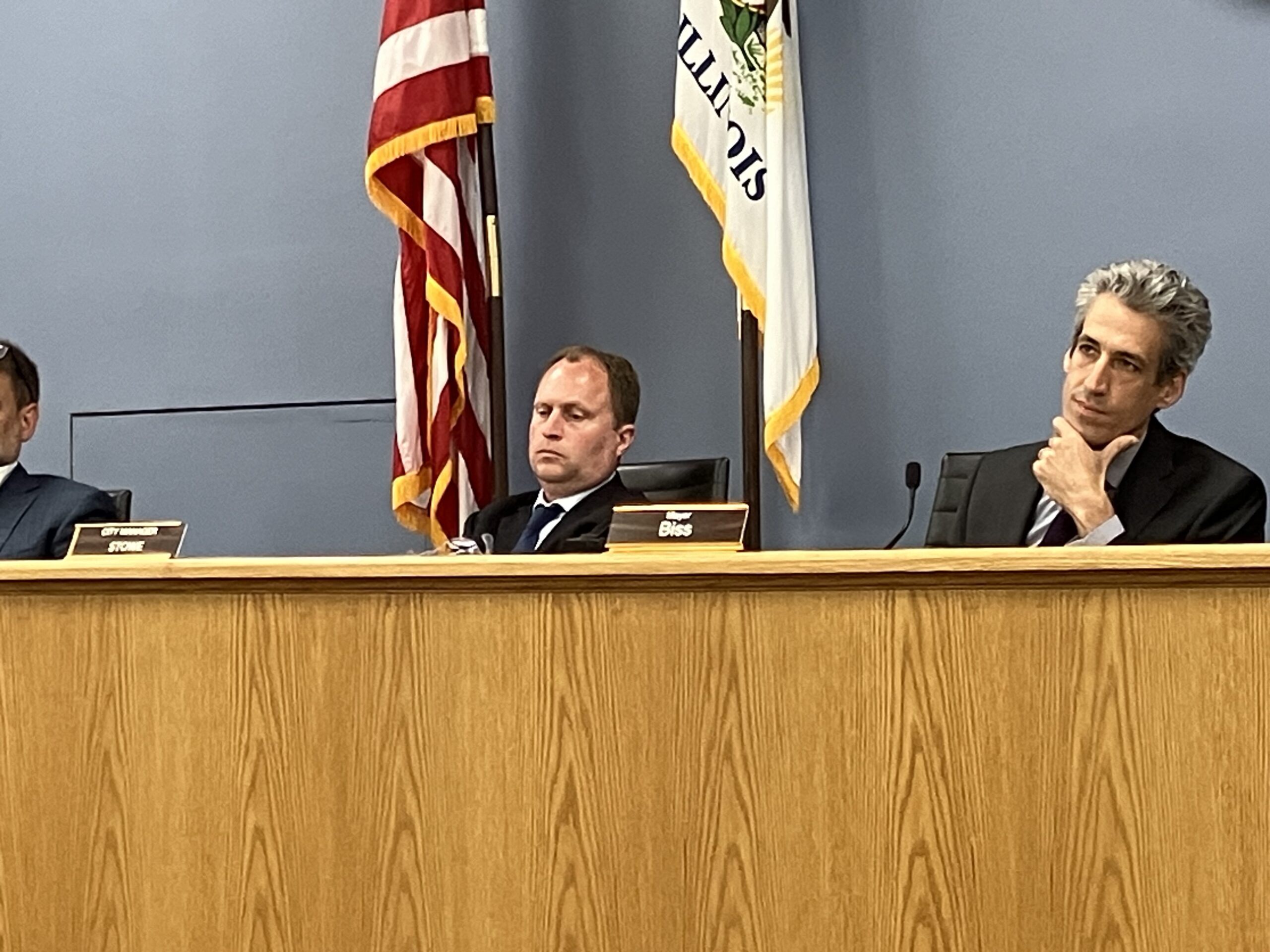City to seek more feedback from local health care providers
By Bob Seidenberg
A proposal to set an Evanston minimum wage won’t be acted upon until at least next month, as multiple City Council members reported Dec. 11 that large health care employers in their wards are raising concerns.
Council Member Devon Reid (8th Ward) has proposed the ordinance, which would establish a minimum wage in Evanston of $15.50 an hour for employers with four to 50 employees and to $16.25 an hour for employers with 51 or more employees. The city ordinance would be effective as of July 1, 2024, with annual increases starting in 2025.
Evanston’s minimum wage currently follows that of Cook County. Cook County’s minimum is $13.70 for non-tipped workers and $8.00 for tipped employees. On Jan. 1, those wages rise to $14 for non-tipped workers and $8.40 for those who receive tips.
If enacted, the proposed Evanston minimum wage for businesses with more than 50 employees would be higher than both the county wage and Chicago’s current minimum wage of $15.80 per hour for employers with more than 20 workers.
Reid’s original proposal has already gone through several revisions since it was introduced. At the Oct. 2 Human Services Committee meeting, Reid offered to remove a provision of the ordinance that would have required employers to pay no less than minimum wage to tipped workers. The provision had run into strong opposition from some members of the city’s restaurant community.
Committee members on Oct. 2 voted 5-0 to move the issue to the full council for consideration. At the Dec. 11 council meeting, though, several council members relayed concerns they had heard from large health employers in their wards.
Revelle: Hospitals fear ‘administrative headache’
Council Member Eleanor Revelle, whose Seventh Ward includes Evanston Hospital, spoke about what she called “a concern from our hospitals.”
Council Members Tom Suffredin and Eleanor Revelle. Credit: Bob Seidenberg
The hospitals have “increasingly numerous hospitals and clinics, etc., in many, many communities around the greater Chicagoland area and their employees don’t necessarily work day after day in the same hospital,” she said. “They move from hospital to hospital. And so they’re concerned about the administrative, whatever you want to call it, [the] difficulty of tracking.”
The hospitals are concerned about “just the administrative headache,” Revelle said, accounting for employees who might work some days in Evanston and then others at another hospital in the system in another municipality with a different minimum wage.
The hospitals “have a lot employees and they move around a lot,” she said.
“I was hoping to have some actual numbers of how many people we’re talking about and just how big this headache is,” Revelle said, “but they [the unnamed hospitals] did ask to be exempt.”
During the discussion, City Manager Luke Stowe said he also had a brief conversation about the issue with Evanston Hospital President Douglas Silverstein who, Stowe said, expressed concerns along the lines described by Revelle. He said the city’s policy coordinator also spoke with an Evanston Hospital representative as well.
Council Member Thomas Suffredin (6th Ward), meanwhile, reported that officials at Westminster Place, a senior living community in his northwest ward, reached out to him.
Westminster already pays its employees above minimum wage, Suffredin said. “They don’t have numbers [on] how this will affect them,” he said. “They want to figure that out.”
Suffredin stressed, “This isn’t someone who is already paying less than the proposal to increase minimum wage.” Rather, he said, “this is like a large employer that’s doing something that we’re trying to encourage. …
“I think it’s prudent to make sure that we have large employers who are already doing what we’re going to try and make everybody do, that we give them time to understand what’s the possible consequences.”
City staff to make regulations
Suffredin asked staff to walk him through the process if employees believe they are not compensated appropriately once the ordinance goes into effect.
Alexandra Ruggie, the city’s interim corporation counsel, said there would be a ticket written against the employer, with the matter coming before the city’s Administrative Adjudication board.
An employer found in violation of the ordinance could face fines of not less than $500 nor more than $750 for each offense, according to the ordinance. Similar to other ordinance violations, there is also a provision that which allows for a private cause of action (lawsuit), Ruggie noted.
Suffredin asked about a case raised by Revelle where an employee works a 40-hour week for the same employer, with seven of the hours in Evanston and 33 of the hours in municipalities with lower minimum wages.
Is “the expectation that they would receive the higher wage for the seven hours or the entire 40 hours?” he asked.
Alison Leipsiger, the city’s policy coordinator, said the ordinance would work similar to the Fair Workweek ordinance passed by the council earlier this year, requiring some employers to provide workers with more predictable schedules.
If the minimum wage ordinance were to pass, staff would be in charge of putting together regulations, Leipsiger said.
Suffredin: ‘Make sure we have this buttoned up’
Suffredin asked if the ordinance would result in additional costs for the city or enforcement could be handled with existing staff.
Leipsiger, after a pause, said “that would be handled by our existing staff.”
Suffredin followed, “I would suggest that we make sure that we have this buttoned up, particularly [related] to our large employers who already pay more than the minimum wage.”
“I think there’s a potential of unintended consequences to do more harm than good if we don’t have that absolutely right,” he said. “I would respectfully request that we make a plan to do that before we get it wrong. There’s a potential for doing some significant damage, particularly to the health care industry at a time when it’s a very competitive environment.”
Fifth Ward Council Member Bobby Burns. Credit: Duncan Agnew
Council Member Bobby Burns (5th Ward) said he had been contacted by Silverstein about the issue. Silverstein – who is scheduled to retire at the end of the year as president of Evanston Hospital – “made it perfectly clear that if we pass this now, he is No. 1, in support,” Burns reported.
“His concern is if we pass this ordinance, the effect on multiple jurisdictions. But he felt comfortable with us passing this and as long as that we were committed to coming back if necessary to make modifications,” he told Council members.
Evanston Hospital is part of NorthShore – Edward-Elmhurst Health, formed in a 2022 merger. Earlier this month, the health system announced it is taking a new name, Endeavor Health.
Endeavor: Not unequivocal support
Endeavor officials, asked about the city’s proposed ordinance, said in a statement Thursday that “while we do not anticipate a significant near-term impact on the ordinance, should the ordinance pass, it is not accurate to say Endeavor unequivocally supports it, as are we are still working through potential long-term applications and precedent.”
Council members had been scheduled to vote on preliminary approval of the minimum wage proposal at their Dec. 11 meeting, setting the item for a final vote at the following meeting on Jan. 8.
Instead, the council supported a proposal by First Ward Council member Clare Kelly, to hold the proposed ordinance over for more discussion until at least Jan. 8. There were several attempts to override Kelly’s holdover, each failing to win the needed two-thirds support.
In calling for the holdover, Kelly argued the council needs more feedback.
“I just think we’re moving forward on things that are either well-intentioned and sound good, but I think we’ve learned that we’ve learned that we really need to do the necessary outreach to really understand impacts,” she said. “So I don’t see any harm in holding this to get a better sense of the impact on our medical providers.”
Some other council members, opposed to the holdover, noted that the proposal was slated for introduction, allowing time before the Council’s next meeting, Jan. 8, for health care providers to respond.
Eighth Ward Council Member Devon Reid. Credit: Duncan Agnew
Reid argued in support of introduction. “This has been before this body multiple times,” he said. “It’s been before the Economic Development Committee. I held a number of town halls with small and medium-sized business owners.”
If the ordinance were to move forward, Reid said, he wanted to make sure that the new proposal had a six-month period to allow staff rule-making. “That is a common part of the process,” he said. “We did it with the Fair Workweek ordinance [with enforcement delayed to Jan. 1], we’re going to do it with this.”
Referring to concerns about employees being split between places, with different minimum wage rates, he pointed to language in the proposal stating that employees are covered by the ordinance if they work two hours or more in a two-week period in Evanston.
He said big box stores such as Target and other large employers who would be covered by the ordinance often shift employees around to different locations.
“I think it is totally appropriate for those folks [employees], if they’re working more than two hours in Evanston, to receive a fair minimum wage,” he said.
Burns: Time to act
Burns also urged moving forward.
“This is an issue that the small-business community has largely endorsed or at least felt that it was something they could get behind,” he said. “It wasn’t a big issue, which is why I don’t think we have small businesses lining up this evening opposing it. They were clear on what amendments they would like to see. I believe those amendments have been made.”
He said to council members, “We need to be able to accept when an issue is contentious and move forward, right? We don’t need to do anything that’s going to create necessary backlogs just because we think somebody needs to give them more time. I don’t think that’s acting in a way in accordance to what we all wanted to strive to do as a council, which is being more efficient with our meeting.”
Responding, Kelly said, “I think we should be careful that we don’t let efficiency trump effectiveness and good policy and potentially unintended harm because we don’t do due diligence to really vet proposals.”
Council members made two attempts to override Kelly’s motion to hold action on the proposed ordinance, with both failing to achieve the two-thirds vote necessary for an override. As a result, the ordinance was held and will be back in front of the council, once again for introduction, on Jan. 8.
Reid expressed disappointment at the decision to delay action.
“There are people in our community who are struggling to make ends meet,” he told council members. “The increase in the minimum wage for many folks will be the difference between being able to pay rent one month, being able to celebrate a Christmas or Hanukkah or whatever holiday they celebrate. And I just want us to keep that in mind.”




